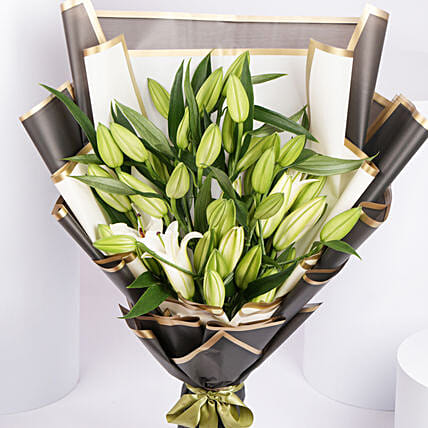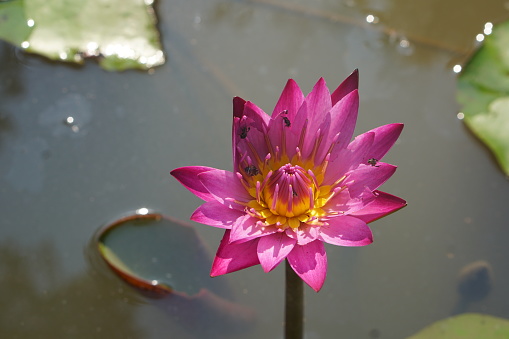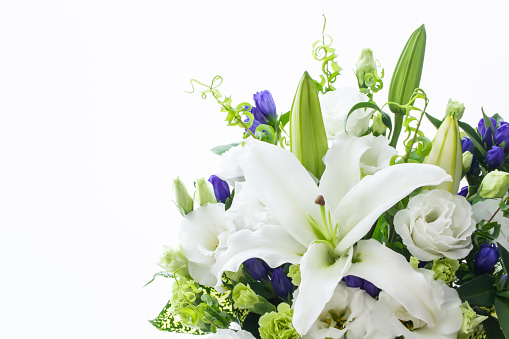If there is one such flower that amplifies the happiness and excitement quotient of any bouquet or arrangement, it’s the lily! Given its majestic looks, exotic vibes and gorgeous colour palette, this bloom never fails to impress. But there’s more to what meets the eye! The flower is enveloped in several myths and cultural significance, with ties linked to ancient Greek stories and the era of ancient Egypt. In this blog, we explore the significance of lilies in different cultures and religions. But first thing first!
About Lily Flowers

FNP
William Blake, an influential Romantic poet, wrote a poem entitled ‘The Lily’ that encompasses its sweet and innocent beauty.
The modest Rose puts forth a thorn,
The humble sheet a threat’ning horn:
While the Lily white shall in love delight,
Nor a thorn nor a thread stain her beauty bright.
The aforementioned lines talk beautifully about Lily flowers beauty and sweet nature. These petaled beauties are perennial flowers that belong to the family Liliaceae. Given its striking features and the variety of colours available, a Lily bouquet also makes up for a popular gift. The flower has been cultivated for thousands of years and has become an integral part of many cultures and religions. Know about some of them below:
Lilies in Ancient Greece
In ancient Greece, lilies were associated with the goddess Hera, the wife of Zeus. According to legend, when the infant Hercules was brought to Hera to be nursed, she pushed him away (as he technically wasn’t her baby) and her milk spilt into the sky, creating the Milky Way. Where the milk fell to the ground, lilies grew.
The flower still holds high regard in Greek culture. To this day, brides wear crowns made up of lilies because of their beauty and symbolism.
Lilies in Christianity

Source: Pixabay
In Christianity, lilies are associated with the Virgin Mary and the resurrection of Jesus Christ. The white lily flowers are a symbol of purity, innocence and virginity, and is often depicted in artwork of the Annunciation, the scene in which the angel Gabriel tells Mary that she will give birth to the son of God. The Easter Lily, which is a white trumpet-shaped lily, is a symbol of the resurrection of Jesus Christ and is a popular flower often used to decorate churches during the Easter season.
Lilies in Buddhism

Source: Pixabay
In Buddhism, the lotus flower is more commonly associated with spiritual significance, but water lilies are also important. In the Buddhist tradition, lilies represent enlightenment and the triumph of the human spirit over adversity. They are often used in Buddhist artwork and as offerings in temples.
The water lily holds a significant meaning in Buddhism and Hinduism, as it represents resurrection, owing to its tendency to close up during the night and reopen every morning, symbolising a spiritual rebirth that happens daily.
Lilies in Islam

Source: Pixabay
In Islamic culture, lily flowers are associated with purity, beauty, and fertility. They are often used in religious ceremonies and as decorations for weddings and other celebrations.
Lilies in Hinduism

Source: Pixabay
Lily flowers have high cultural and religious significance in Hinduism. They are commonly associated with Goddess Saraswati, who is the goddess of knowledge, wisdom and creativity. During the festival of Vasant Panchami, which marks the onset of spring, lilies are offered to the goddess as a symbol of purity, innocence, and enlightenment.
Lilies are also used for decorative purposes in Hindu weddings, especially in South India. These flowers are arranged in stunning garlands, centrepieces and floral decorations for the wedding ceremony and reception. Lilies are also used in home décor, have been used in traditional ayurvedic medicine and also believed to have anti-inflammatory & anti-bacterial properties.
Lilies in China

Source: Pixabay
In China, lilies are associated with good luck, abundance, happiness and prosperity. The Chinese word for lily, baihe, is similar in sound to the word for harmony, baihe. As a result, lilies are often given as gifts to promote harmony and good relationships. So for this, and many more reasons, lilies make up a popular flower for weddings.
Lilies in Japan

Source: Pixabay
In Japan, lilies are associated with death and rebirth. They are often used in funeral ceremonies and are a symbol of the fleeting nature of life. However, they are also seen as a symbol of hope and new beginnings and are often given as gifts to wish someone a speedy recovery from illness.
So, you see, Lily flowers are a versatile bloom that has been revered in cultures and religions across the world for centuries. However, regardless of their meaning, lilies are beautiful and meaningful flowers that will continue to hold a high significance. So, whether you’re buying a bouquet for a birthday, a special anniversary or just treating yourself, lilies are a forever choice.






